Eric Kripke, creator of ‘The Boys’: ‘The stuff that keeps me up at night isn’t how to make another penis explode’
The fourth season of the superhero series ramps up the political satire. ‘We’re being manipulated to hate each other and I find that very hateful,’ says its showrunner
The fourth season of The Boys begins with a campaign rally for the White House. The protagonist, a vice-presidential hopeful, is a woman with a handy superpower: blowing heads off with her mind. Behind her is the narcissistic and sadistic Patriot, a superhero so popular that he has been able to kill a man in cold blood in the street and be cheered by his fans. The Boys has never done things by halves. The latest episodes (Amazon Prime Video premiered the first three on June 13, followed by a new one each week) raise the tone of the political and social satire that characterizes the series created by Eric Kripke, which is based on the comics by Garth Ennis and Darick Robertson.
“I think it’s a more intense season. I think it’s a more political season because we’re dealing with a U.S. presidential election. We have a superhero that’s a heartbeat away from the White House. I think we deal with a lot of political issues, but also a lot of the things that people love about The Boys, a lot of outrageous humor, a lot of heart, a lot of exploding body parts, and a lot of blood...” Kripke said during a video call interview in late May. Its gory brutality, its irreverence and its strong satirical edge set this superhero story apart from the rest. Which of those aspects — the gore or the politics — gives its screenwriters the biggest headaches? Kripke laughs at the question: “Headaches in that I’m terrified that it’s happening in the real world, or headaches like hard to write? I would say we live in a world where satire just comes right in daily in the news. I would say the thing that gives me the most headaches is the character stuff. Revealing new facets of who they are, being honest to their psychology, letting them be complicated real people.” Kripke, who two days before this season’s premiere announced on X that the next installment, the show’s fifth, will be the last in the series, continues: “In the writer’s room we spend 70% of the time just talking about the characters. And then once we get that right, then we say, OK, what are some of the crazy things that could happen that’ll help us on that journey. But the stuff that keeps me up at night isn’t how to make another penis explode. It’s, oh my God, I need to figure out where Butcher’s mind would be in this moment.”
The political side of the series takes on more prominence in fiction, and also more relevance as it becomes a mirror of reality in an election year in the United States. Since its early days, the series has reflected a tremendously polarized society. This breeding ground is more smoldering than ever in a season that, in its opening scenes, features Patriot in a trial that divides the population: at the courthouse doors, staunch supporters await him on one side of the fence and, on the other, dozens of detractors. The recent trial of Donald Trump inevitably comes to mind.
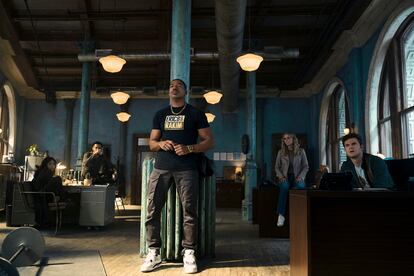
For Kripke, this polarization is one of the most serious problems in today’s society, and one that has an explanation: " We’re trying to make the point that this polarization of society, where there’s us and them and they are evil and they must be destroyed, and this whole thing that’s really happening in the world. We’re just trying to make the point that we’re all being manipulated to feel that way by much more powerful forces that are using billions of dollars and AI algorithms to get us to turn on each other, because it serves them financially. I happen to be liberal, and my problem isn’t with someone who is on the right wing. My problem is that we’re both being conditioned to think of the other as an enemy instead of a neighbor. And that’s really, really dangerous, and it’s happening around the world and because one: it makes more money to feel that way. You spend more time online the angrier you are. And two: authoritarians need you to feel that way because then you’re not looking at that critically. So I’m just trying to make the point that we’re actually not all that different. We’re being manipulated to hate each other and I find that very hateful.”

The characters added to the new season help take that political satire a bit further. Two superheroines join the group of The Seven. Sister Sage (Susan Heyward) is the smartest person in the world, but being an African-American woman, her ideas have never been taken into account and her frustration levels are extreme, in turn making her extremely dangerous. The other superheroine is Firecracker (Valorie Curry), a reflection of the media that spreads extreme right-wing messages and the expansion of conspiracy movements. Kripke doesn’t hide the reference to politician Kristi Noem, a possible running mate for Trump: “We have a legitimate vice-presidential candidate who’s talking about when she shot one of her puppies. And somehow that’s okay, because you can be some pistol-packing gun nut,” says the screenwriter. The final major addition this season allows Kripke, creator of the series Supernatural, which ran for 15 years, to reunite with actor Jeffrey Dean Morgan, who plays mysterious CIA analyst Joe Kessler.
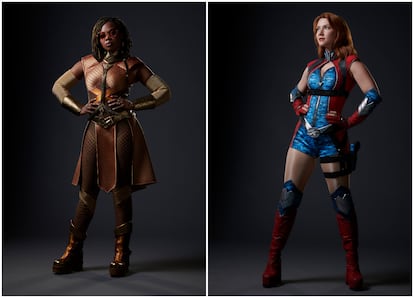
Some critics describe The Boys as one of the most politically charged shows currently on the air. The accentuation of that political character was, for its creator, the natural path with the directions the plot was taking, and because it is also reflected in the original comics. “And then also we knew that we’d be airing pretty close to an election year in the United States. And so it felt right to make an election part of the story, to make Patriot’s trial part of the story, because we saw a lot of those things coming down the road.”
Speaking of the Patriot trial, Kripke reacts with irony when asked about the comparisons between the ruthless character played by Antony Starr and Donald Trump: “That’s shocking. How could you have gotten that, drawn that conclusion? How dare you? Yes, absolutely,” he laughs as he gesticulates exaggeratedly. “It’s a very strange phenomenon, and it’s not just Trump. There are a lot of people around the world, unfortunately, that are following that model. But the idea that you are a celebrity who wants to be an authoritarian dictator is pretty new and scary.”
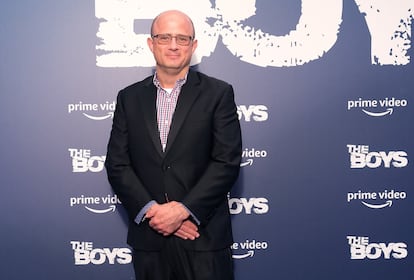
November’s U.S. presidential election has opened the door to Trump’s return to the White House. His previous term provided wings, and content, for comedy shows like Saturday Night Live, but made things more complicated for some fictional series, whose scriptwriters recognized that their job had become more difficult in a world where reality constantly surpassed fiction. Could Trump’s return be good for The Boys by offering extra material? “That would be terrible for The Boys. That would be terrible for the world. If there’s one thing we point out in season four, it’s maybe you shouldn’t have a malignant narcissist baby-man be your president. If we help a couple of people come to that conclusion, it’ll be great.”
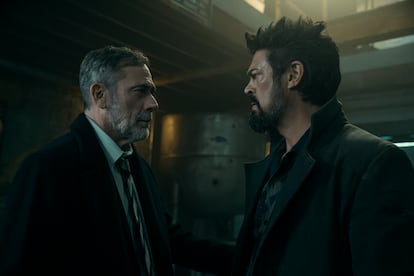
Kripke assures The Boys’ writers that they have total freedom from the platform and the studio, Amazon and Sony, respectively: “We self-censor way more than they censor us. As shocking as the show is I never want it to feel cheaply gratuitous, like we’re doing something just because we can. I never want that. I want to be able to explain to the actors with a straight face why we’re putting them in that insane situation. And the answer can’t just be because it’s funny. It has to be because this is part of your character’s story, or this is a part of the world we haven’t seen before. If it can’t meet that criteria, then we don’t do it.”
In a series where anything can happen, it’s no surprise that Kripke confesses that what he enjoys most is writing the character of The Deep (Chace Crawford). “The Deep is a very fun character to write for because he’s so blindingly stupid that you can write things a little goofier and you can relax a little more. The other characters are harder to write for; you have to analyze the choices they’re making. But The Deep just wants to fuck an octopus and go to parties, so he’s just a blast.”
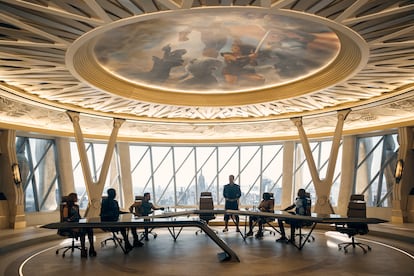
Superheroes have been dominating screens, both in film and on television, for years. For Kripke, the quick explanation for this phenomenon is “because they make money.” But he also observes a certain exhaustion among viewers. “The Marvel movies are very, very well made. I’ve seen all of them. I just think they’re big, entertaining, fun movies. And because people’s appetite for them was so strong, it really grew. Now I think they’re getting a little tired of them. And so the responsibility is really on people like me. I have to make sure that I’m really showing the audience things they haven’t seen before,” he concludes.
Sign up for our weekly newsletter to get more English-language news coverage from EL PAÍS USA Edition
Tu suscripción se está usando en otro dispositivo
¿Quieres añadir otro usuario a tu suscripción?
Si continúas leyendo en este dispositivo, no se podrá leer en el otro.
FlechaTu suscripción se está usando en otro dispositivo y solo puedes acceder a EL PAÍS desde un dispositivo a la vez.
Si quieres compartir tu cuenta, cambia tu suscripción a la modalidad Premium, así podrás añadir otro usuario. Cada uno accederá con su propia cuenta de email, lo que os permitirá personalizar vuestra experiencia en EL PAÍS.
¿Tienes una suscripción de empresa? Accede aquí para contratar más cuentas.
En el caso de no saber quién está usando tu cuenta, te recomendamos cambiar tu contraseña aquí.
Si decides continuar compartiendo tu cuenta, este mensaje se mostrará en tu dispositivo y en el de la otra persona que está usando tu cuenta de forma indefinida, afectando a tu experiencia de lectura. Puedes consultar aquí los términos y condiciones de la suscripción digital.









































